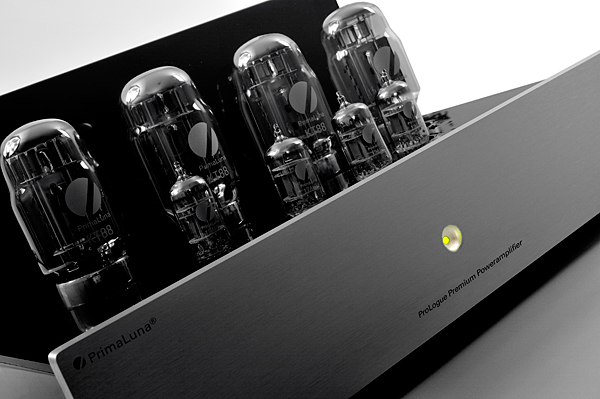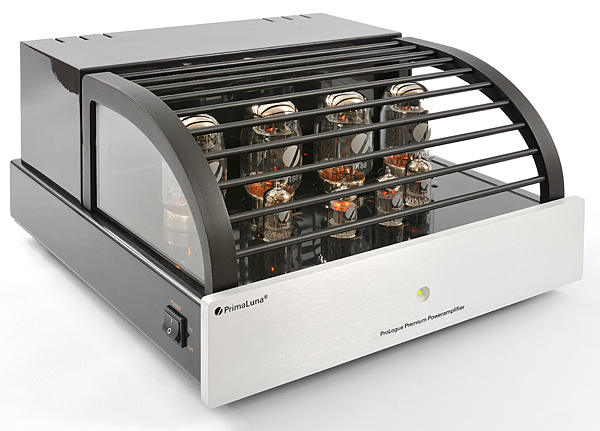| Columns Retired Columns & Blogs |
Herb,
Greetings! I see an "Iggy" installed in your current system.
Hopefully, a review is forthcoming???
I appreciate your writing style, with comprehensive/comparative reviews. (smile)
All the best,
Will
Listening with KEF's LS50 speakers
You know those scenes in old movies: a gangster grabs a flunky by the shirt, shoves him up against a wall, and snarls, "Listen, punk—you're in for it now!" Well, that's exactly what the 35Wpc PrimaLuna ProLogue did to my KEF LS50s ($1499.99/pair)—and with Charlie Haden's early digital recording The Ballad of the Fallen (LP, ECM 1248), no less! In "Too Late," a duet with Carla Bley (who wrote the tune), the playing is all deep plucked double bass and left/right-hand piano contrasts. Through the KEF LS50s, Haden's bass was unabashedly bigger and stronger, and sounded distinctly more real, than I ever thought possible from these minimonitors. Unfortunately, Bley's right-hand notes were annoyingly hard and shiny. But this is a digital recording from 1982—what else should I expect? Despite the recording's slightly strident sound, the combo of Pass Labs HPA-1 preamplifier, ProLogue Premium, and KEF LS50s made this record worthy of repeated plays and showing off to friends.

When it comes to Miles Davis, I'm more a Bitches Brew than a Kind of Blue kind of person. Kind of Blue (1959) has this exquisitely formed but backward-looking (ie, modernist) modal structuring that makes me long for John Cage or Ornette Coleman. In contrast, Bitches Brew (2 LPs, Columbia PG26) gets me lost in the dark, druggy, openly questioning electric-piano funk of Chick Corea, Larry Young, and Joe Zawinul in early 1970. Miles and his producer, Attilio Joseph "Teo" Macero, introduced a new, forward-looking, emotionally penetrating jazz-pop format characterized by long, plaintive trumpet drones, Harvey Brooks's genre-bending Fender bass, John McLaughlin's surrealistic electric guitar, and Macero's wild looping and sampling innovations. On Bitches Brew, all of these diverse musical viewpoints converge to forge a new, multicultural, postmodern, dystopian angst that still seems relevant today.
Always . . .
What I always hope for from specialist hi-fi is that the structural and creative aspects of a musical performance will be brought forward so that I can notice and appreciate them. The PrimaLuna ProLogue Premium driving the KEF LS50 minimonitors did this with every record I played. This singular important quality—along with eight octaves of forceful, refined tone and the most impactful bass I have yet heard from the KEFs—makes this a distinctly recommendable combination of amp and speaker.
With DeVore Fidelity's Orangutan O/93 speakers
DeVore's Orangutan O/93s ($8400/pair) have been in and out of my system for almost three years now, and they're still my primary reference for highly revealing, properly balanced, "just right" reproduction. The ProLogue Premium enhanced each of those qualities—especially the highly revealing part. With the O/93s, I could hear what I felt certain is actually on that recording of Messe de la Septuagésime. I could better recognize the relationship between the close-miked voices and the sound of the hall. Decca's recording engineer (Kenneth Wilkinson?) really did create a satisfying balance, and the ProLogue Premium had no trouble showing it to me.
"My fellow Americans . . ."
The Electric Flag's first album opens with these words by then-president Lyndon B. Johnson: "I speak tonight for the dignity of man and the future of America. I urge every member of both parties . . ."
I've been a fan of drummer Buddy Miles since 1968, when I saw him play with Mike Bloomfield and the newly formed Electric Flag. I have played no recording more often than I have Electric Flag's "A Long Time Comin'" (LP, Columbia CS 9597), released in March of that year, which features an amazing cast of musicians, including Bloomfield on guitar, Harvey Brooks on bass, Barry Goldberg on keyboards, Nick Gravenites and Cass Elliot on vocals, and Richie Havens playing percussion and sitar. This disc, and Bob Dylan's Highway 61 Revisited (which also features Bloomfield and Brooks), anchored my transition from boy to man. Unfortunately, nowadays, no matter what system I play it on, my 1A/1A pressing never sounded as good as I remember it sounding in 1968—until now. The ProLogue Premium and Orangutan O/93s got it more right than any system I can remember hearing it through in the last 40 years. The PrimaLuna-DeVore combo showed me clearly how poor the original stereo mix is, but I didn't care—it so well reconstituted the lyrical, free-flowing momentums and staccato horn section of the Flag's signature cover of Howlin' Wolf's "Killing Floor" that it made me feel it as if I were 16 again. "I should have quit you . . ."

It was difficult to stop all that Buddy-and-Harvey expressionism, but I felt a sudden urge to move on to something higher up the musical food chain—the Mahavishnu Orchestra's Birds of Fire, from 1973 (LP, Columbia KC 31996). Composer-guitarist John McLaughlin builds musical structures as if they were constructed of fiercely vibrating skyscraper beams, and the sensational Rick Laird (bass) and Billy Cobham (percussion) give McLaughlin's art a majestic architectural pulse. The PrimaLuna ProLogue Premium let each musical line display its own design. Micro- and macro-contrasts were expressed in a way that made the poignant, clashing rhythms of "Open Country Joy" feel like intersecting riptides. By side 2, I could fully perceive McLaughlin's post-and-beam construction—it was about 85% as solid as I know it to be, and as well sorted as I have ever experienced it. And the exceptional transparency of the ProLogue Premium made "One Word" sound extraordinarily deep, wide, and sensuous (footnote 2). Drum textures were sharp and definite. Bass was taut and clear.
With Zu Audio's Soul Supreme speakers
As I ran AudioQuest's GO-4 cables between the Zu Soul Supremes ($4500/pair) and the 8-ohm taps of the PrimaLuna ProLogue Premium, I had a good feeling. Then, listening to Finbar Furey play Uilleann bagpipes as his brother Eddie accompanies him on acoustic guitar, on their Irish Pipe Music: Hornpipes, Airs & Reels (LP, Nonesuch Explorer H-72059), I immediately realized that this was a divine stereo recording, and that the Zu-PrimaLuna was a divinely lucid combination of speakers and amp.
The sensitive Soul Supremes presented every reel and air and hornpipe with a lively verity that I can describe only as fresh and invigorating. I'd just gotten this LP, and was deeply impressed by the literary, musical, and recording artistry behind every song. My favorite, though, is "The Fox Chase," which opens with Finbar speaking and giving us the gist of the musical narrative. During every minute of this zigzagging instrumental, the PrimaLuna-Zu combo delivered full-tilt, almost explosive excitement, a big spatial perspective, and genuine corporality. Tonal character—even through the highest highs—was exemplary.
Two weeks and countless recordings later, I'm still listening to "The Fox Chase" through this same system. I can say, without reservation, that the PrimaLuna ProLogue Premium driving the Zu Audio Soul Supremes comprises a system that sounds as if it should cost at least $21,000, not less than $7000.
21st-Century Tubes
The PrimaLuna ProLogue Premium is made in China and costs only $2199. Nonetheless, it showcased a neutral, clear-water transparency that was the equal of my reference amplifiers—including the twice-as-expensive Line Magnetic LM-518IA integrated amplifier ($4450). It let midrange tonalities shine through with something approaching true radiance. Stringed instruments, Uilleann pipes, and women's voices were reproduced in the purest Technicolor. Maybe they didn't sound as textured, as radiant, or as shamelessly luminous as they do through the LM-518IA (which I've been using as a power amp), but still: they were radiant, in that special, clear way that tube fanatics crave. Nothing about the ProLogue Premium's sound seemed unnaturally warm. The ProLogue Premium delivered a well-managed, 21st-century tube transparency that seems to be unique to PrimaLuna products. It may be this amplifier's most obvious and compelling attribute.
Equally obvious was how clearly and powerfully the ProLogue Premium reproduced bass. Even through small speakers, bass scale—the ability of deep sounds to also be big sounds, when they're supposed to—was exceptional. High frequencies had a captivating purity. If the PrimaLuna lacked anything, it was the firm but gentle rhythmic authority of the more expensive First Watt J2, designed by Nelson Pass, which may be the world champion of "just right" loudspeaker control. The ProLogue Premium also lacked the J2's meaty, superbly textured midrange and its sensational giddyup and dance élan. However, unlike the J2, which struggled with speakers with impedances of less than 8 ohms, the ProLogue Premium remained comfortable and musical driving speakers that presented loads as low as 4 ohms—but no lower.
PrimaLuna's ProLogue Premium has become my new reference for low-power, high-value amplification. Class A sound at a Class C price.

Prima Luna are built by CAYIN/SPARK in China. You should give them a try, they are the real deal and you will find where all that Prima Luna bla, bla comes from. CAYIN is one of the top and most respected chinese audio manufactures. Stereophile published rave reviews of several CAYIN products some years ago. They are tube oriented but their DAPs are also outstanding and worth checking. You can get CAYIN in North America from Audionation in Canada or VAS Audio.

An amplifier with 8 ohm output impedance that will sound different with every different pair of speakers. Great!

I went a different direction, but this is what put the brakes on my interest in their Dialogue Integrated for now. I feel like I need to spend some time with a demo unit mated to my speakers before committing.

Herb, your comparison to the LM518ia is certainly high praise. I have O93s and have been leaning towards the 518 ever since I heard it at my local shop with a pair of the O96s. That stated, I'm a sucker for the midrange from a nice quad of EL34 tubes. To get to the musicality and punch of the integrated LM, which can be spookily good, was your preferred pairing the PrimaLuna with the Rogue Audio RP-1 preamp, which you reviewed earlier this year?

I'd have to think of it as an Audiophile "Gold Standard". The Linn Kan and the ProAc Tablette too.
If a person owns these he's discerning.
Jim Theil's CS3's have the same drivers plus a lower octave woofer.
Your new Lady Reviewer owning LS3/5a is what makes her credible, in my eyes.
We used to have a pair of these playing (non-stop) in our big High-End demo room ( at my Esoteric Audio ), people would walk in and listen thinking they were hearing the Big Speakers in the Center Front. We were using Electrocompaniet Amps.
An all time great Transducer System, way under rated in today's Audiophile World.
Other Greats would include Magnapan MG2, original Quads ( 1957 ), Linn Kan, ProAc Tablette. All of these are "Desert Island" choices.
Now-a-days, a pair of Genelec 8020s with some 6dj8s or 6SN7s ( in the Pre ) are even nicer.
Tony in Michigan